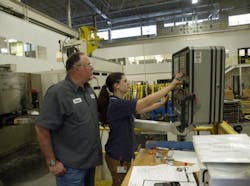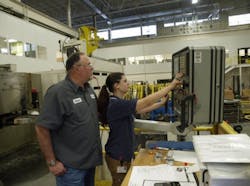In 2011, when Siemens found themselves closing their Canadian plant and folding their N.C. gas turbine productions, the Charlotte, N.C., plant had to double their workforce. With the sudden demand for more workers, Siemens realized they needed to institute a better training program to prepare new workers - specially recent graduates - to be successfull at the specialized positions they needed to fill. That's when they knew it was time for a change.
Their solution was an apprenticeship program at the plant that summer, said Dawn Braswell, Siemens training manager at Charlotte. Braswell talked about best practices in apprenticeship programs to a packed room at the IndustryWeek Best Plants conference in Charlotte last week. (Of the hundred or so attendees, only a few raised their hands when asked if they actually had an apprentice program at their plants.)
The German-headquartered Siemens already had a well-established apprenticeship program, and Braswell thought it was time to bring that program to the US.
Siemens' Charlotte apprenticeship program sponsors about 10 students each summer for six weeks of training. Six or seven typically go on to the full four-year apprenticeship program, which includes 6,400 hours of on-the-job training and 1,600 hours of coursework at nearby Central Piedmont Community College. The apprenticeship is registered through the North Carolina Department of Commerce, so apprentices earn credentials along with their training.
For the first two years in the program, apprentices are contract workers, Braswell told the group. They’re each assigned a mentor and go through onboarding including safety training. After that, they apprentice as full-time employees. Once they graduate with a degree in applied science in either computer integrated machine or mechatronics, they receive employment at Siemens if a job is available.
Braswell added that they do an open house to convince parents that working in manufacturing isn't the 'dirty, unreliable' job they expected.
“We’re investing a lot of money in these apprentices,” Braswell acknowledged. “We’re doing it because we can’t find anybody to do these jobs. So I can either train them later at a much higher cost, or I can train ‘em now.”
To see the full-length article, go here.
About the Author
Aaron Hurd
Aaron Hurd

Leaders relevant to this article:

